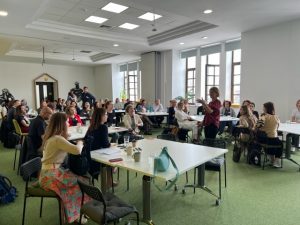The extraordinary role of local actors in responding to multiple crises, and why the time to support them is now
12 Jul 2023

Paweł Łukasiak, Chair of the Board, Academy for the Development of Philanthropy in Poland
Inspired by the many discussions that took place at the recent #ShiftThePower regional meeting in Bucharest in May (organized by the Global Fund for Community Foundations, Federation of Romanian Community Foundations, Bucharest Community Foundation and National Network of Local Philanthropy Development in Ukraine), I decided to share some experiences and reflections from our organization, the Academy for the Development of Philanthropy in Poland. The Academy has been nurturing the growth of philanthropy to support local communities, working with socially involved companies and running various grantmaking programmes for the last 25 years.
In Bucharest, many valuable ideas and proposals emerged, ranging from simplifying grantmaking procedures, supporting social goals while strengthening local philanthropic organizations and local funds, growing support to informal initiatives, as well as rethinking outdated reporting procedures.
The world of NGOs has undergone many changes in recent years – the COVID-19 pandemic and Russia’s ongoing aggression against Ukraine have accelerated the pace of this change. Just one example is the emergence of thousands of informal initiatives during COVID-19, who were often the first to help those most excluded during the pandemic. Over the past year, especially in Poland, these groups and initiatives have also been providing much needed aid for refugees (according to UNHCR data, there are over 1,500,000 refugees from Ukraine in Poland). In our country, the direct involvement of citizens at the local level in organizing humanitarian aid has been nothing short of extraordinary.
Chains of cooperation
It is thanks to these informal groups and initiatives that humanitarian aid has been reorganized and delivered on a massive scale. “Chains of cooperation” have been created, without which some activities would simply not be impossible – for example, the mass transportation of refugees from the border to places of safety. These chains of cooperation have been driven by a whole host of local leaders, often young people, who have shown the importance of flexibility, the use of new technologies, speed, cooperation and the readiness to act.
The first few months after the outbreak of war was the time to focus on basic humanitarian aid for refugees. Now, more than a year later, the provision of food and clothing has been replaced by other, more complex challenges such as employment and housing. Washing machines are now needed more than clothes. Bicycles are required so that young people can get to school. Direct scholarships and funding for refugees is extremely important, as they allow for individuals to determine how their own basic needs can be best met. Beyond practicalities, long-term social integration and inclusion is a priority. Especially now, during the summer holidays, the provision of care for children and young people is of great importance. That is why the opening of sports centers, the organization of summer and integration camps for children and young people is so critical, for example.
As informal initiatives and citizens’ groups continue to play critical roles in their communities, they must be supported in these efforts. However, even beyond funding, we need to consider how this is offered. Supporting such groups requires changes in procedures and ways of doing things. This is starting to happen in many places. At the Academy, we too are busy updating our ways of working. These adaptations have made it possible to provide more appropriate support.
Reports don’t speak
From our perspective, one priority is fostering a new culture of reporting and communication, supported by training, consulting and sharing of knowledge. Traditional reporting on completed projects has many disadvantages. First, apart from specialists who analyze the reports on behalf of donors, nobody reads these reports. Second, the formal language of reports often fails to show the true value of local projects – empathy, spontaneity, joy of action!
As organizers of support programmes and grant programmes, we have a responsibility to simplify and digitize our procedures to incorporate new forms of communication and to create ecosystems open to new generations of volunteers and leaders on the local scene, including informal groups. We need to find ways to let the channels of communication flow in all directions and to be truly infused with our values, emphasizing the sharing of resources and building of cooperation (not just numbers and paragraphs).
For example, we launched the “Tell me your story…” initiative as part of the Act Locally programme. Working with the Polish-American Freedom Foundation and 76 Act Locally Centres, we have already supported over 14,000 local projects of NGOs and informal groups. To supplement more formal reporting mechanisms, “Tell me your story…” aims to encourage grantee partners to look for new, creative ways to describe and promote the impact of their activities. The videos, diverse communication materials and stories we have received tell the real stories of local leaders and volunteers. These have been shared widely on social media, and not only promote individual projects but, as a collective, tell the story of the whole programme. These stories are now reaching wider and different audience and have use to the organizations producing them, rather than just sitting on the desk of a grant officer as a typical report would. Examples of some of the award-winning videos can be found here.
Adapting while supporting
At the Academy we will continue to do our part, adapting as we can to best support our partners. We are keenly aware of the toll the last several years has taken, and the significant challenges facing them. It needs to be stressed that local philanthropic organizations need to take this time to rebuild their resources, including human resources: employees and volunteers. From countless talks with our partners, the most common pain expressed is that the last few years, and especially the last few months, have been a time when they have devoted most of their resources. Simply put, we must help those who help others. Help them to mobilize new and different local and international resources. The chains of cooperation built with donors and aid organizations in the early months of the war must continue to be nurtured. We must recognize and support those who have been in “emergency response mode” since the start of the pandemic, and who continue to adapt and respond as the war in Ukraine endures.
Just as a handful of environmental organizations will not save the world from climate catastrophe, we must all engage in efforts to change attitudes and to build support for local organizations and initiatives. We have fresh memories of COVID-19. This experience shows that challenges can be overcome. This experience also shows how important it is to work together in many countries, in many environments, in many local communities; how important the chains of cooperation are that extend from the international to the local level. And that, at the local level, change is taking place. That is, in fact, where the leaders of the future are working now. Let’s join them!
By: Paweł Łukasiak, Chair of the Board, Academy for the Development of Philanthropy in Poland
Additional reflections on the #ShiftThePower regional meeting in Bucharest…

Olena Danilova, Charitable Foundation “Podilska Hromada” (Ukraine)
“For our organization, the Charitable Foundation “Podilska Hromada”, these days it is extremely valuable to be in the same space as community foundations from around the world. It is important to see and understand the powerful work of these local actors, and the great potential they have! Learning from their experiences and knowledge, and understanding how they are making positive changes in different parts of the world: this is what motivates and unites us.
For those of us who joined from Ukraine, the topics raised in Bucharest are more relevant than ever – particularly the transfer of resources, power and responsibility to local communities. Over the past two years, we have understood better than anyone else that people on the ground come together faster, respond to needs quicker and know how to use the resources in their community as efficiently as possible. The format of the Bucharest convening allowed for open dialogue and exchange. We heard about both “victories” and “defeats”, as well as effective tools and strategies from different people and foundations. We sincerely thank the organizers for the opportunity to join, speak, gain experience and build an important sense of unity!”

Nadejda Dermendjieva, Bulgarian Fund for Women (Bulgaria)
“The #ShiftThePower event in Bucharest was one of the most participatory, interesting, and refreshing events I have ever participated in. It was great to talk about philanthropy in a space where not only you felt safe but you were understood. We discussed topics such as core support, European funding, the changing landscape in philanthropy and the dynamic context(s) that are fundamental to me and to my work in Bulgarian Fund for Women. I’m glad that I participated, got to know representatives of community foundations all over Europe and learnt about some local Romanian initiatives.”

Éva Fekete, Local Threads Community Foundation (Hungary)
“The meeting in Bucharest was a great opportunity for me to see the global network of community foundations. When we hear the word ‘global’ we think of an enormous network of unimaginable size. But at this meeting I was able to meet people, people who are actively working for their communities with all their skills, working for a better world both locally and globally.”




